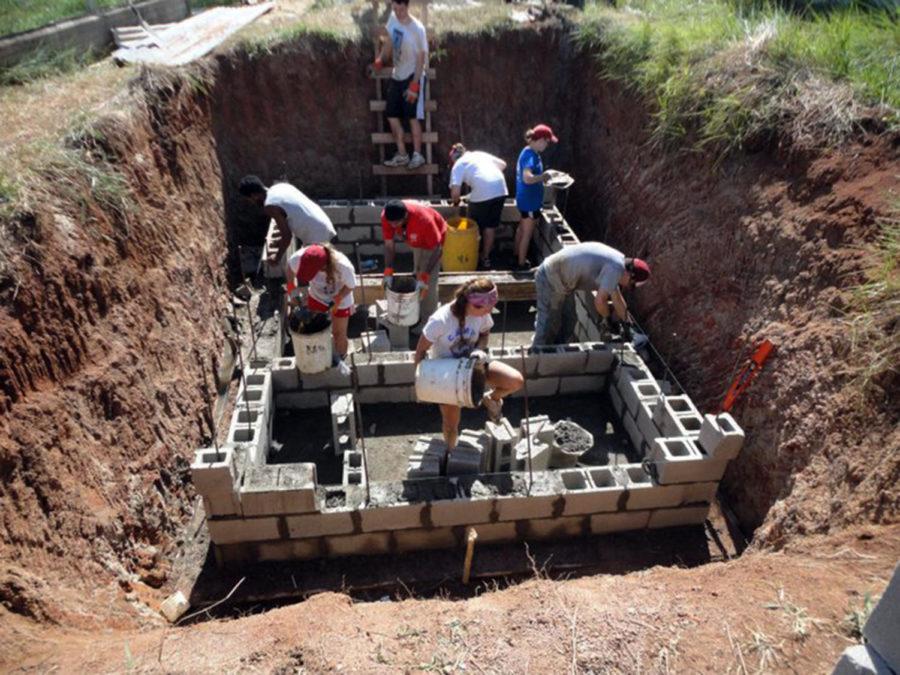Yetley: The value of hard work
ISU students construct a septic tank by hand in Belize for a study abroad program during spring break 2012, demonstrating the benefit hard work has to the community.
July 10, 2012
To many, there is a stigma on working with your hands for a living.
People may argue what the definition of what “working with your hands” entails, but I’m referring to occupations such as a mechanic, construction worker or any seen on the show “Dirty Jobs.” As negative as the stigma may be, there is an incredible amount of importance these workers bring to society and a real sense of integrity after a day of hard labor.
I recently read Matthew Crawford’s book “Shop Class for Soul Craft.” Crawford started out as an auto mechanic’s assistant during high school. He went on to earn a Ph.D. in philosophy and political theory, and he eventually became an editor correcting scholarly articles. He was so upset with the mundane daily activity at this job he felt he needed a change. Matthew quit his job and went back to his earlier hobby of restoring and repairing motorcycles, which for him was much more of a rewarding and fulfilling lifestyle.
I’ve had a job since I was old enough to work. They were fairly easy jobs, but it was constant work. Most of my jobs have been neither intellectual nor seriously physically laborious, but the first couple jobs I had taught me a lot about what it means to work. In high school, I worked at Panera Bread as an associate, standing behind a counter and taking orders. Later I worked multiple waitressing jobs, which were much more dependent on customer service. Both were good experiences, but it was the same thing every day, and my feet would hurt after standing or running around for eight hours.
I recently was fortunate enough to have the experience of going to Belize through a study abroad program at Iowa State. Their short programs allow a student to take a class for a semester then travel for a short time — I was gone for just a week. But on this trip, we did a lot of labor intensive work — things I would have never thought I was capable of doing.
The first couple days of work, we helped on a butterfly farm mulching the plants and creating a cement path. The second period of time was spent building a septic tank at Toledo Community College High School, which had 2,000 students but only one bathroom per gender with perhaps three toilets in each.
The cement work we performed did not include a cement truck or any modern technology. We had to sift sand by shoveling it onto a mesh wire contraption, which would sort the small grains out for the cement. Then we hauled the sand in 10-gallon buckets over to where we were mixing the cement and dumped the sand onto rusty pieces of sheet metal. Following that, using shovels we mixed the sand with cement mixture and water.
And it was heavy. Anybody who knows a little bit of physics knows the horrible amount of force you put into a shovel to produce a little bit of work. But we hauled the cement in 10-gallon buckets down into this giant hole where the septic tank would be and poured it into the holes in the bricks to create the walls that would separate the waste — all in 90 degree weather with humidity.
It was dirty work with a dirty end goal, but it was essential for the livelihood of the students in Punta Gorta. The part I appreciated the most about Belize was we were there to provide something for a community, much like any construction worker is there to build structures that our own community uses. Restoring motorcycles or waitressing is a much more individualized form of that service, where we ply our trade constructing relationships and interactions among people.
I can’t speak for Matthew Crawford, but when I’m waitressing, the reason to continue day after day is because I have a sense of pride in knowing I made that table’s night enjoyable. Personally I don’t think dinner out is about the necessity of eating, it’s about the experience of the restaurant. The greatest part of that experience is the human interaction. That service is not only important to the vitality of the community — it also builds a sense of integrity for those who do the work, knowing that you completely finished a project and didn’t take the easy way out.

















